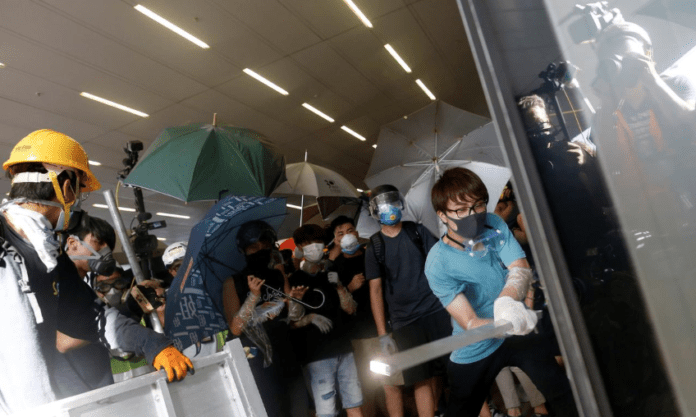

Cate Cadell, Ben Blanchard
BEIJING (Reuters) – China on Tuesday deplored violence in Hong Kong that saw protesters ransack the city’s legislature, fuelling expectations it will take a tougher line on the territory, even as details of the scenes of vandalism went largely unreported on the mainland.
Massive protests in the former British colony that began early last month came to a head overnight on Monday, prompting predictions that the police would take a harder stance, the city would be forced into a tighter embrace with the mainland and Hong Kong leader Carrie Lam would be forced out.
Beijing called the violence an “undisguised challenge” to the “one country, two systems” model under which Hong Kong was granted a high degree of autonomy when it was returned to China in 1997.
“We express outrage about this and strongly condemn it,” China’s foreign ministry office in Hong Kong said in a statement.
The backlash comes amid growing resentment over what many in Hong Kong see as declining freedoms as China tightens its grip over the territory under the leadership of President Xi Jinping, who warned two years ago that Beijing would not tolerate any challenge to its authority in Hong Kong.
The official China Daily newspaper, published in English and often used by Beijing to get its message out to the rest of the world, said that the best way to deal with Hong Kong was yet further economic integration with the mainland.
“The only way for (Hong Kong) to sustain economic growth and maintain stability is for it to further integrate its own development into the nation’s overall development, especially by playing its part in advancing the Belt and Road Initiative and Guangdong-Hong Kong-Macau Greater Bay Area,” it said in a Tuesday editorial. Belt and Road is a string of ports, railways, roads and bridges and other investments connecting China to Europe via central and southern Asia.
“Both development programs serve as practical platforms for Hong Kong to generate more growth momentum that can be translated into practical benefits for local residents.”
TOUGHER LINE
Kenneth Ka-Lok Chan, an associate professor at Hong Kong Baptist University and a former Hong Kong lawmaker for the pro-democracy Civic Party, expects Beijing to back Hong Kong to crack down even further.
“They will rely heavily on the police force to restore so-called law and order, so the police will be further reinforced in terms of aggressiveness against protesters,” he said.
Mathew Wong, an assistant professor of social sciences at the Education University of Hong Kong, said Beijing was likely to let the protests peter out.
“Like the Umbrella Movement, the protest cannot keep up the intensity forever, especially when the option of letting the police put them down is readily available,” he said, referring to the pro-democracy “Occupy Central” movement that lasted 79 days in 2014 before police cleared protesters.
He also said Lam was unable to retain her job, even if Beijing keeps her in place for the time being to save face. The central government has repeatedly expressed its support for Lam and for her decision last month to suspend the extradition legislation.
“Regardless of whether the initiative was her idea or Beijing’s, the fact that it turned out to be a mess is fatal.”Slideshow (3 Images)
One Beijing-based Western diplomat, speaking on condition of anonymity, said it was significant that Xi himself had not come out and offered public support for Hong Kong’s embattled leader yet, keeping a low profile while the territory convulses.
FOREIGN ‘BLACK HAND’
China has blamed the “black hand” influence of foreign governments, especially the United States and Britain, for the unrest in Hong Kong, a view that one Chinese official told Reuters was reinforced by the destruction in the legislature.
“It’s the Western countries who are encouraging them. It’s very obvious,” the official said, declining to be identified given the sensitivity of the matter.
On Chinese social media, users flooded the comments sections of state media posts condemning the violence, calling for Beijing to respond harshly, although the unrest was not fully covered in state media and footage was blocked on the mainland’s heavily censored internet.
“Declare martial law or Hong Kong has had it,” wrote one on the Twitter-like Weibo site, though there has been no sign People’s Liberation Army forces based in Hong Kong have been put on standby should things get totally out of control.
“Send in the tanks to wipe them out,” wrote another.
On the streets of Beijing, some people said they had not seen news of what had happened in Hong Kong.
Nursing graduate Zoey, 26, said she hadn’t paid much attention to Hong Kong’s “problems”.
“Have you seen anything of Hong Kong’s demonstration? No, I haven’t heard of anything. Because we normally read Weibo, but if it didn’t get to the hot topics on Weibo then we wouldn’t see it. Sorry.”
Reporting by Cate Cadell and Ben Blanchard; Additional reporting by Gao Liangping; Editing by Tony Munroe and Nick Macfie





